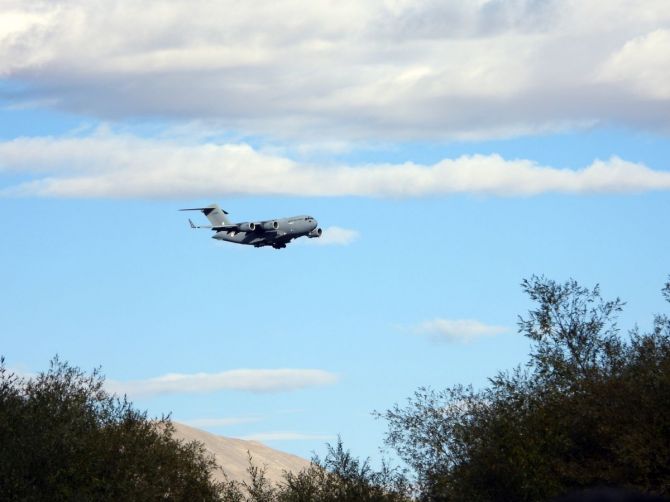'India and China are already in a war-like situation.'

"China will use Tibetans to create friction on the LAC," warns Lieutenant General P J S Pannu (retd), former commander of the Leh-based XIV corps, in the concluding part of the interview to Rediff.com's Archana Masih.
The Pentagon's annual report includes details about a 100-home village inside Arunachal Pradesh -- between the Tibetan Autonomous Region and Arunachal Pradesh. What dangers does this pose and how best can India counter this?
China has been wary of Tibetan resistance and India's support of the Tibetan cause for a long time.
However, in the last couple of years as China has adopted a more aggressive stance, it wants Tibetans to become stake holders and support China.
China will use Tibetans to create friction on the LAC.
China has carried out a lot of infrastructure development in Tibet. Its constant endeavour is to showcase this 'prosperity' to the Tibetans.
If Indians question the creation of border villages, the Chinese will convey to the Tibetans that Indians are objecting to the development of Tibet and the Tibetan people.
Hence, China is using Tibetans as a tool to achieve their own interests.
How best can India counter this?
The India-China border dispute is unresolved despite the prolonged boundary negotiations.
Setting up villages near the LAC poses border management problems. A democratic country cannot put strict curbs on villagers in forward areas like the PLA.
The PLA can lift a village overnight; it can relocate villagers. China is aware that as a democratic country India will not exercise such measures.
The Eastern Army Commander has said that the Siliguri corridor is sensitive -- is China opening new fronts? How can we strengthen our positions here?
China's infrastructure development in Dokalam (Bhutan) was blocked by the Indian Army in 2017.
China claims western Bhutan and by building a road there it is trying to drive a wedge into the Siliguri corridor.
The Siliguri corridor is a narrow strip -- on the south lies Bangladesh and on the north is Bhutan.
The road being constructed in Bhutanese territory would bring the Chinese very close to the Jampheri Ridge which overlooks the Siliguri corridor.
The PLA's field artillery with 30 km range will be able to target our movements in the Siliguri corridor.

The situation on the border is deadlocked and tense. As a former corps commander do you feel the two countries are headed for war?
Yes and no. India and China are already in a war-like situation. The wars of the future are going to be different.
Today's wars are in the realm of non-kinetic, non-contact warfare - these wars will be fought through cyber, space and missile attacks.
The enemy can target our cyber and space assets. The threat of the use of a hypersonic missile is very serious.
This war will not be fought on the border alone. Border skirmishes will constitute only one aspect of this multi-dimensional war. China has the capability to strike in the rear. It can affect the entire nation by targeting trade, digital economy, stock market, power grids, banking, railways, aviation systems etc.
These attacks can be carried out from a third country and can be outrightly denied by the enemy.
What are some aspects the Indian Army should be vigilant about in the second winter of the standoff?
- We should hold onto our points on the LAC while we negotiate to establish status quo ante.
- Ensure that Pakistan and China do not create a situation where both fronts have to be dealt with together.
- The military should be prepared for any contingency within the area of responsibility.
- The boundary dispute should be resolved.
Feature Presentation: Aslam Hunani/Rediff.com











 © 2025
© 2025